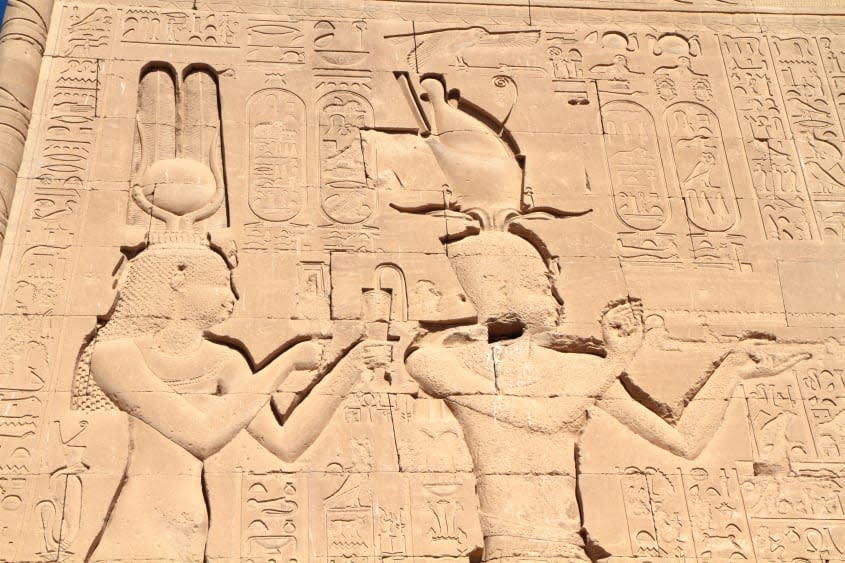Netflix's Cleopatra controversy, explained

- Oops!Something went wrong.Please try again later.
- Oops!Something went wrong.Please try again later.
Who knew that Cleopatra could still inspire fierce debates two millennia after her death? Netflix has come under criticism from the Egyptian government for casting a Black actress, Adele James, to play the ancient monarch in its new docudrama series African Queens.
That casting is inaccurate, Egyptian officials said after the trailer was released, according to The New York Times. "Statues of Queen Cleopatra confirm that she had Hellenistic (Greek) features, distinguished by light skin, a drawn-out nose and thin lips," Egypt's Ministry of Tourism and Antiquities tweeted in April. But the backlash has produced a backlash. "It is more likely that Cleopatra looked like our actor than Elizabeth Taylor ever did," director Tina Gharavi wrote at Variety. How did a new Netflix show become embroiled in racial controversy?
What is Netflix's African Queens about?
The two-season series is produced by Jada Pinkett Smith, Quartz reports, and covers the reigns of both Cleopatra and Queen Njinga, who ruled over portions of present-day Angola during the 1600s. The point, like last year's movie The Woman King, is to "highlight the lost stories of African female warriors and rulers." "We need to have more information and more content around Black queens that have lived," Smith said at the show's London premiere. "There is just not a lot of accessible content around these stories."
What has been the response?
It has occasionally gotten ugly. After the show's trailer was released on YouTube, the Times reports, "Netflix was forced to disable comments as they turned into a hostile, and occasionally racist, pile on." Then the Egyptian government weighed in, asserting that Cleopatra simply wasn't Black. One minister called the series a "falsification of Egyptian history," NBC News reports. CBS News adds: "Some Egyptians complained that the feature was appropriating their culture and rewriting their history." And the conversation spilled out into international arenas, with segments on The Daily Show and Piers Morgan's Talk TV show in the United Kingdom.
How did the filmmakers respond?
They pushed back. Deadline reports that Jane Root, the show's executive producer, put out a statement noting that Cleopatra's race is still a debate among scholars. "We decided to depict Cleopatra of mixed heritage to reflect these theories and the multicultural nature of ancient Egypt," she said. "Race in her times was a long way from what it is now." Gharavi, meanwhile pointed out that actresses like Monica Bellucci, Angelina Jolie, and Gal Gadot had either been cast or considered to play Cleopatra in previous productions of her story. "Why shouldn't Cleopatra be a melanated sister?" she wrote. "And why do some people need Cleopatra to be white?"
James, who is of mixed heritage, also responded forcefully. "I find it sad that people are either so self-loathing or so threatened by Blackness that they feel the need to do that," she said in a podcast interview, "to separate Egypt from the rest of the continent" of Africa.
What are commentators saying?
"This insistence on her whiteness is curious, as much of her lineage (including her mother's race) is unknown," The Guardian's Leila Latif writes in her review of the series. Some specifics are known, but others are lost to history, and "to default to whiteness is insidious and ridiculous."
Skin color isn't the only criterion for Blackness, Gwen Nally and Mary Hamil Gilbert write in the New York Times. They quote Shelley Haley, a Cleopatra expert who consulted on the series. "When we say, in general, that the ancient Egyptians were Black and, more specifically, that Cleopatra was Black," Haley says, "we claim them as part of a culture and history that has known oppression and triumph, exploitation and survival."
The debate misapplies modern categories to the ancient world, Islam Issa writes at Al Jazeera. Issa says his is the only voice in the African Queens series. "The largely binary racial terms being used today are anachronistic and can hardly be applied to Cleopatra's context." And it's also true that depictions of Cleopatra have varied widely over the years: "During the Middle Ages, she was represented as blonde; during the neoclassical craze, stereotypically Hellenic." It's no surprise that a new depiction has emerged "when systemic racism is being called out like never before."
What's next?
More Cleopatra. Netflix's African Queens premiered on the streaming service on May 10. But that won't be the end of the story. Variety reports that a government-owned Egyptian broadcaster, Al Wathaeqya, will produce its own big-budget documentary about Cleopatra in response to the Netflix production.
You may also like
The college rankings rebellion
How do you interview Donald Trump, anyway?
GOP-led states reportedly accusing JPMorgan Chase of religious bias

